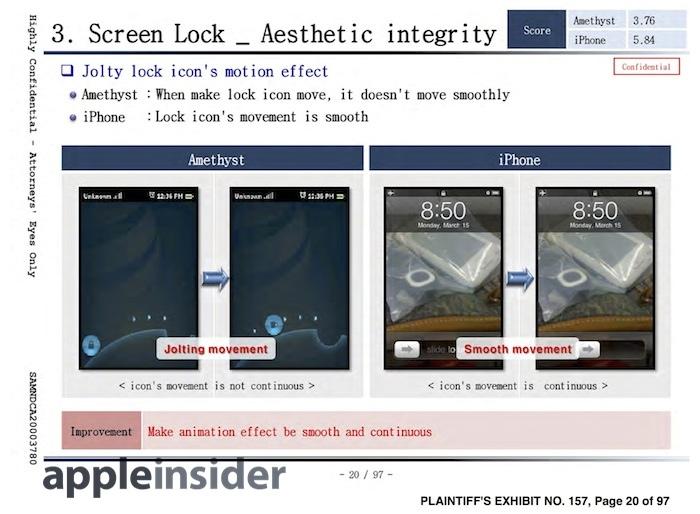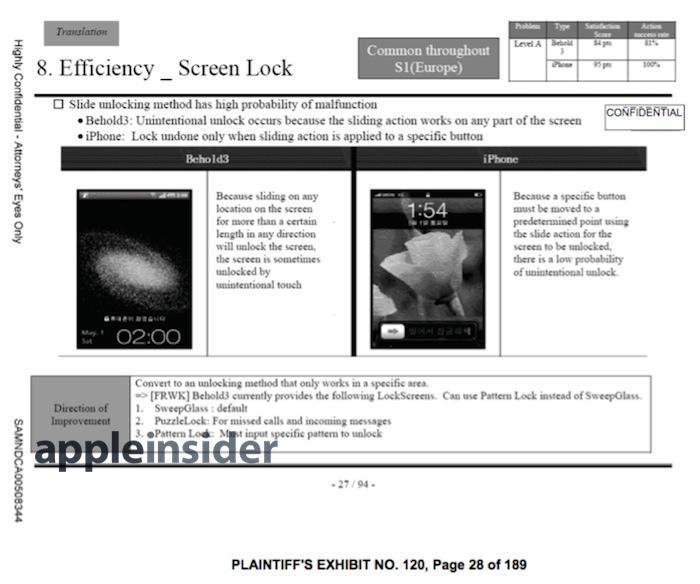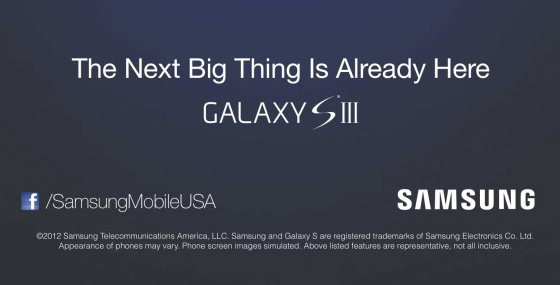Continuing to grind through its long list of expert witnesses on Monday, Samsung brought up two company executives, as well as three Google engineers, to further its case of non-infringement of five Apple patents.
According to multiple in-court reports, Samsung opened up week three of the second Apple v. Samsung patent trial by forwarded its argument that the Korean company's massive success in the smartphone industry owes to strong marketing, not alleged copying of Apple's patented iPhone features.
Executive Youngmi Kim, a senior UI designer who has worked on Samsung's user experience team since 2004 vehemently denied the notion that her company's software borrowed from Apple's designs, reports Re/code.
When asked if Samsung stole "slide-to-unlock" from Apple, Kim said, "Absolutely not. If we were to work on the same thing as Apple, that would not give us any advantage in terms of differentiating our products, so that would not make any sense."
Kim was also questioned about internal papers — referred to by some as "copy cat" documents — comparing Samsung's phone unlocking mechanism with Apple's. According to the designer, the documents from 2010 are irrelevant as Samsung's implementation was fixed by 2009.
In addition to patent talk, much of Monday's proceedings revolved around a strategy to prove marketing, not allegedly aped features, pushed Samsung to the top of the smartphone charts, reports The New York Times.
According to testimony from Samsung America's chief marketing officer Todd Pendleton, the company had a major branding problem when it came to smartphones. Pendleton said that when he joined Samsung in 2011, he did not know the company even had a smartphone lineup.
"I think people knew Samsung for televisions," Pendleton said. "But in terms of smartphones, there was no recognition for what our product was or what it stood for."
He went on to claim Samsung's smartphone offerings were better than Apple's at the time, despite owning a fourth-place marketshare behind HTC and BlackBerry. Marketing, said Pendleton, was one of the main sales drivers that ultimately netted Samsung a huge share of the industry.
Most notable among the various campaigns was the introduction of "The Next Big Thing" blitz that parodied the iPhone's marketing strategy. These ads were the topic of an email conversation between Apple SVP of Worldwide Marketing Phil Schiller and the company's go-to ad agency TBWA/Media Arts Lab. Both agreed Samsung's campaign was cause for concern.
Pendleton also revealed that a tactic used by Samsung marketing was the disruption of major iPhone launches. During cross examination, Apple counsel presented an email from former Samsung executive Dale Sohn, who wrote, "Beating Apple is no longer merely an objective. It is our survival strategy."
"There will be a tsunami when iPhone 5 is coming," Sohn said, adding that Samsung needed a response to offset Apple's momentum. Pendleton admitted that his company had a plan in place to disrupt the new iPhone's launch. The exact scheme was not detailed, though the company did run a series of print and TV ads at the time mocking both Apple's handset and customers.
Finally, Samsung called up Google engineers to testify that certain features seen in its phones, like data syncing, are core functions of the Android operating system. This is the second time the case's defense attorneys called on Google to prove certain features alleged to infringe on Apple patents were created by the Mountain View, Calif. tech giant. The move is, in effect, using Google as a shield to Apple's claims.
 Mikey Campbell
Mikey Campbell









-m.jpg)






 Mike Wuerthele
Mike Wuerthele
 Malcolm Owen
Malcolm Owen

 Amber Neely
Amber Neely
 William Gallagher
William Gallagher




-m.jpg)






50 Comments
And yet Apple is the one that [I]certain[/I] people claim is only successful because of marketing. :\
What an empty, filthy, dishonest, and despicable company devoid of any real value, meaning or ethics.
They’ve admitted it themselves! No one supporting them has any argument whatsoever.
Surely Samsung wouldn't put up one of its own execs that didn't vehemently deny copying the iPhone!
Isn't it perjury to lie on the stand?
Do those Samsung people have to swear on a bible? If not, what do they swear on?
And some of those Samsung employees sound really clueless.
The Samsung America chief marketing officer didn't even know that Samsung made smartphones when he joined in 2011? It sure sounds like Samsung hires really well qualified people who know their stuff.
And then he goes on to claim that Samsung made better phones than Apple?
Yeah, he sounds like a real authority on phones.
It's fairly obvious that Samsung ripped off a whole lot from Apple, and if there's any justice to be had, then they should pay up big time.
I want to see them lose to the tune of billions of dollars. I want Fandroids to be openly weeping out in the streets.